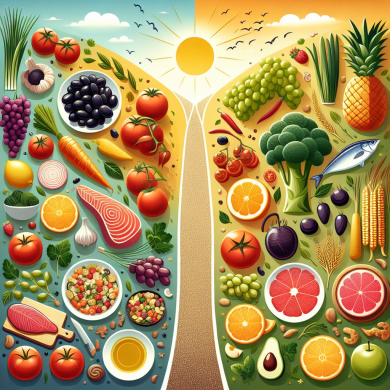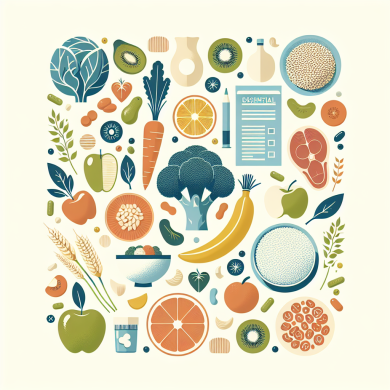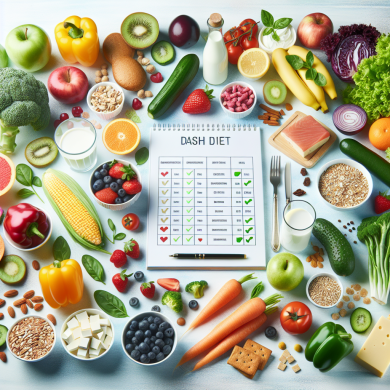DASH Diet: Boosting Kidney Health Effectively
Introduction
The Dietary Approaches to Stop Hypertension (DASH) diet is widely recognized for its role in managing blood pressure. However, its benefits extend beyond cardiovascular health. A growing body of research indicates that the DASH diet can also significantly enhance kidney health. This article explores how the DASH diet can be a powerful ally in maintaining and improving kidney function.
Understanding Kidney Health
The kidneys play a pivotal role in maintaining overall health by filtering waste products and excess fluids from the blood, regulating electrolytes, and managing blood pressure. Chronic kidney disease (CKD) is a progressive condition characterized by the gradual loss of kidney function. The DASH diet, with its focus on nutrient-rich foods, can help mitigate the risk factors associated with kidney disease.
Core Principles of the DASH Diet
The DASH diet emphasizes fruits, vegetables, whole grains, lean proteins, and low-fat dairy while reducing the intake of sodium, added sugars, and saturated fats. Its nutrient-rich composition is beneficial not just for hypertension but also for supporting kidney health. Here are the core components of the DASH diet:
- Fruits and Vegetables: These provide essential vitamins, minerals, and antioxidants. They are low in sodium and high in potassium, which is key in lowering blood pressure—a common contributor to kidney damage.
- Whole Grains: Foods like brown rice, quinoa, and whole wheat bread are high in fiber, which aids in maintaining healthy blood sugar levels and supports digestion.
- Lean Proteins: Incorporating sources like poultry, fish, beans, and nuts helps in meeting protein needs without the saturated fats found in red and processed meats.
- Low-Fat Dairy: These products provide calcium and vitamin D, crucial for bone health, which is often compromised in individuals with CKD.
- Reduced Sodium: Keeping sodium intake low helps manage blood pressure and reduces the burden on the kidneys.
Mechanisms of the DASH Diet in Supporting Kidney Health
The DASH diet helps in controlling blood pressure, managing blood sugar levels, and reducing inflammation, all of which are vital in preventing kidney damage. Here’s how the diet positively impacts kidney health:
Blood Pressure Regulation
Hypertension is a leading cause of kidney disease. By emphasizing foods rich in potassium, calcium, and magnesium, the DASH diet helps to relax blood vessels, thus lowering blood pressure. The reduction in sodium intake further supports this effect, providing a dual approach to managing hypertension.
Blood Sugar Control
High blood sugar levels can damage blood vessels in the kidneys, leading to CKD. The DASH diet’s focus on whole grains and fiber helps stabilize blood sugar levels, reducing the risk of diabetes—a major risk factor for kidney disease.
Inflammation Reduction
Chronic inflammation is associated with kidney damage. The antioxidants found in fruits and vegetables help combat oxidative stress and inflammation, promoting overall kidney health.
DASH Diet in Action for Kidney Health
Implementing the DASH diet involves making informed food choices that align with its principles. Here’s how you can incorporate it into your daily routine to support kidney health:
Meal Planning
Plan meals around the core components of the DASH diet. For example, start your day with a breakfast of oatmeal topped with fresh fruits and nuts. For lunch and dinner, focus on incorporating a variety of colorful vegetables, lean proteins, and whole grains.
Snacking Smart
Choose snacks that align with the DASH principles, such as fresh fruits, unsalted nuts, or yogurt. These options provide essential nutrients without excess sodium or sugar.
Mindful Cooking
Use herbs and spices instead of salt to flavor your meals. This not only enhances taste but also contributes to reduced sodium intake.
Scientific Evidence Supporting DASH and Kidney Health
Several studies have highlighted the positive impact of the DASH diet on kidney health. Research published in the “Journal of the American Society of Nephrology” found that adherence to the DASH diet was associated with a reduced risk of developing CKD. Another study in “Hypertension” demonstrated that the diet significantly lowered blood pressure, a key factor in preventing kidney damage.
Adapting the DASH Diet for Advanced Kidney Disease
While the DASH diet is beneficial for preventing kidney disease, individuals with advanced CKD may need to modify their dietary intake. Here are some considerations:
Potassium and Phosphorus Management
In advanced CKD, the kidneys may struggle to balance potassium and phosphorus levels. It’s important to consult a healthcare professional to tailor the DASH diet to individual needs, potentially limiting certain high-potassium foods like bananas and oranges.
Protein Intake
While protein is essential, individuals with CKD may need to moderate their intake to reduce the burden on the kidneys. Focus on high-quality protein sources and consult a dietitian for personalized recommendations.
Conclusion
The DASH diet is a versatile and effective approach to enhancing kidney health. By emphasizing nutrient-rich foods and reducing sodium intake, it addresses key risk factors associated with kidney disease. Whether you’re looking to prevent CKD or manage existing kidney conditions, the DASH diet offers a sustainable and health-promoting dietary pattern. As always, it’s important to consult with healthcare professionals to tailor the diet to your specific health needs.















Add comment